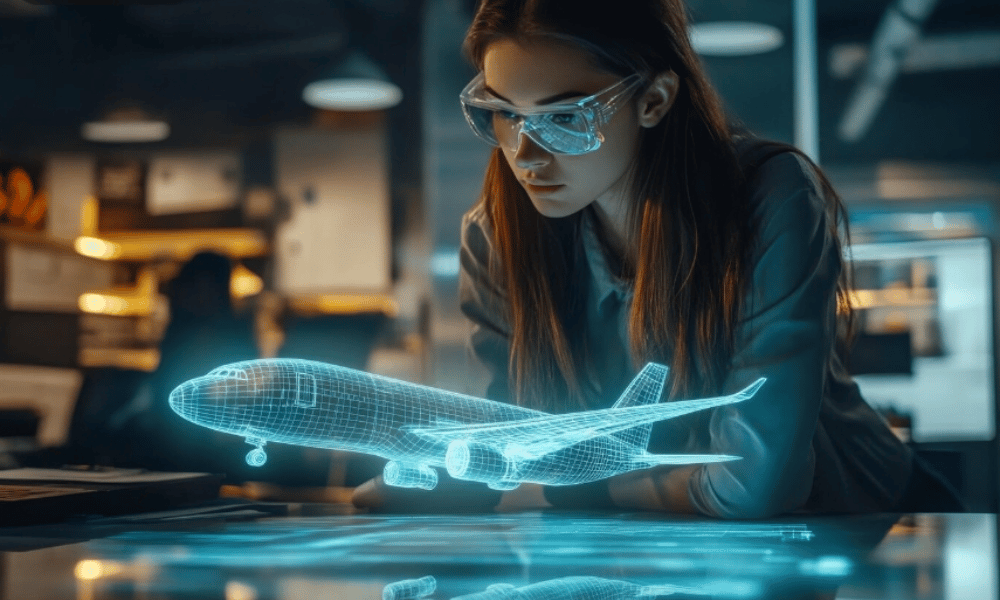
The airline industry operates in a high-stakes environment where precision, efficiency, and customer satisfaction are essential for success. Artificial intelligence (AI) is now playing a pivotal role in revolutionizing this sector, driving transformations that enhance operational efficiency, optimize costs, and improve passenger experiences. From streamlining maintenance to personalizing travel options, AI’s impact is undeniable.
This article explores how AI is reshaping airlines across eight major areas, supported by data, real-world examples, and insights into future trends.
1. Predictive Maintenance: Reducing Downtime and Enhancing Safety
Aircraft maintenance is a critical yet resource-intensive aspect of airline operations. Traditional schedules often lead to unnecessary inspections or overlooked mechanical issues. AI-powered predictive maintenance changes the game by analyzing sensor data in real-time to detect potential failures before they occur.
How It Works:
Aircraft are equipped with thousands of sensors that monitor components like engines, hydraulics, and avionics. These sensors generate terabytes of data during each flight. AI algorithms process this data to predict wear and tear, flagging components that may need servicing.
Impact:
- Cost savings: Predictive maintenance can reduce maintenance costs by 20-30%.
- Operational efficiency: Airlines experience 35% fewer delays due to technical faults.
- Improved safety: Proactive detection minimizes the risk of in-flight emergencies.
For example, EasyJet has adopted predictive maintenance systems to monitor its fleet, reducing delays caused by technical issues by 10%.
2. Optimized Revenue Management Through Dynamic Pricing
Dynamic pricing, powered by AI, ensures airlines maximize revenue by adjusting ticket prices in real-time based on demand, competition, and market trends. This method replaces static pricing models with smarter algorithms capable of understanding customer purchasing behavior.
Key Features:
- Real-time updates: AI analyzes historical and current data to set competitive yet profitable prices.
- Demand forecasting: Algorithms predict demand for routes, adjusting prices accordingly.
For example, Delta Air Lines uses AI-driven revenue management tools to optimize pricing across its network. According to McKinsey, such tools have helped airlines achieve revenue increases of up to 10%.
3. Enhanced Passenger Experience Through Personalization
AI is transforming how airlines interact with passengers by providing personalized services that enhance customer satisfaction. From booking to arrival, AI tailors every aspect of the journey, tapping into the broader technology trends in the airline industry.
Applications:
- AI Chatbots: Virtual assistants like Lufthansa’s “Mildred” respond to queries about flights, baggage policies, and seat availability.
- Recommendation Engines: AI suggests upgrades, in-flight meals, and travel add-ons based on passenger preferences.
- Loyalty Programs: AI analyzes spending patterns to deliver targeted offers to frequent flyers.
This personalized approach boosts engagement and retention. According to a Forbes study, personalized interactions increase customer satisfaction by 30%.
4. AI-Powered Safety Measures
Safety is paramount in aviation. AI enhances safety through advanced surveillance, real-time risk analysis, and automated decision-making.
Examples:
- Real-Time Air Traffic Management: AI predicts potential airspace conflicts and suggests adjustments, ensuring safer skies.
- Pilot Monitoring Systems: AI evaluates pilot performance, detecting signs of fatigue or stress that could impact decision-making.
NASA’s AI-driven air traffic systems have been shown to reduce collision risks by 50%
5. Baggage Handling and Logistics Automation
Lost or delayed baggage is a significant pain point for travelers. AI-powered systems are revolutionizing baggage tracking and logistics.
Features:
- Real-time tracking: RFID and AI-enabled scanners track baggage throughout its journey.
- Optimization algorithms: AI improves the efficiency of baggage loading and unloading.
For instance, Singapore Airlines has implemented AI-driven baggage tracking systems that notify passengers of their luggage’s location via a mobile app. This has reduced baggage mishandling by 15%.
6. Sustainability Through AI
Environmental sustainability is a growing concern for the airline industry, and AI is helping airlines reduce their carbon footprints.
Applications:
- Fuel Optimization: AI algorithms optimize flight paths and cruising altitudes, reducing fuel consumption by 10-15%.
- Efficient Load Management: AI balances cargo loads to minimize fuel burn.
Etihad Airways’ AI-driven Greenliner initiative has successfully reduced emissions on specific routes, showcasing AI’s potential to support sustainability goals.
7. AI in Cargo Operations
The air cargo sector is experiencing significant growth, and AI is at the forefront of this transformation. From demand forecasting to route optimization, AI ensures that cargo operations are cost-efficient and reliable.
Key Benefits:
- Demand Forecasting: AI predicts seasonal cargo demand, enabling better planning.
- Optimal Routing: Algorithms identify the fastest, most fuel-efficient routes.
FedEx and UPS have adopted AI-powered tools for route optimization, leading to millions in cost savings annually. Airlines are now adopting similar strategies.
8. Revolutionizing the Airport Experience
Airports are integrating AI to enhance operational efficiency and improve passenger experiences.
Innovations:
- Facial Recognition: AI streamlines check-ins and boarding by identifying passengers quickly.
- Smart Kiosks: AI-enabled kiosks assist with baggage drop-offs and ticket changes.
- Queue Management: Algorithms predict passenger flow, reducing bottlenecks at security checkpoints.
For example, Beijing Daxing International Airport’s AI-powered systems have reduced boarding times by 20%.
9. AI and Future Technology Trends in Airline Industry
Looking ahead, AI will continue driving innovation in the airline industry. Key trends include:
- Autonomous Aircraft: AI will support pilotless flights in the coming decades.
- Passenger Sentiment Analysis: AI will gauge passenger moods to enhance onboard experiences.
- Hyper-Personalization: AI will use granular data to create tailored travel experiences.
According to IATA, the adoption of AI technologies could save the industry $35 billion annually by 2030.
Challenges in AI Adoption
While AI offers immense benefits, challenges remain:
- Data Privacy: Ensuring passenger data security is crucial.
- Integration Costs: Implementing AI systems requires significant investment.
- Regulatory Compliance: Governments must establish clear guidelines for AI in aviation.
Overcoming these hurdles will be key to realizing AI’s full potential in the industry.
Conclusion
AI is reshaping the airline industry by enhancing efficiency, improving passenger experiences, and driving sustainability. Its applications span every aspect of operations, from predictive maintenance to personalized customer service. As airlines continue to invest in AI, they will not only gain a competitive edge but also set new standards for safety, efficiency, and innovation.







